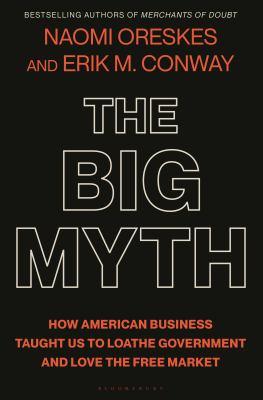
The big myth : how American business taught us to loathe government and love the free market
In their bestselling book Merchants of Doubt, Naomi Oreskes and Erik M. Conway revealed the origins of climate change denial. Now, they unfold the truth about another disastrous dogma: the "magic of the marketplace." In the early 20th century, business elites, trade associations, wealthy powerbrokers, and media allies set out to build a new American orthodoxy: down with "big government" and up with unfettered markets. With startling archival evidence, Oreskes and Conway document campaigns to rewrite textbooks, combat unions, and defend child labor. They detail the ploys that turned hardline economists Friedrich von Hayek and Milton Friedman into household names; recount the libertarian roots of the Little House on the Prairie books; and tune into the General Electric-sponsored TV show that beamed free-market doctrine to millions and launched Ronald Reagan's political career. By the 1970s, this propaganda was succeeding. Free market ideology would define the next half-century across Republican and Democratic administrations, giving us a housing crisis, the opioid scourge, climate destruction, and a baleful response to the Covid-19 pandemic. Only by understanding this history can we imagine a future where markets will serve, not stifle, democracy.
Available Copies by Location
| Location | |
|---|---|
| Victoria | Available |
Browse Related Items
- ISBN: 9781635573572 (hardcover)
- Physical Description ix, 565 pages : illustration ; 25 cm
Content descriptions
| Bibliography, etc. Note: | Includes bibliographical references and index. |
Additional Information

Publishers Weekly Review
The Big Myth : How American Business Taught Us to Loathe Government and Love the Free Market
Publishers Weekly
(c) Copyright PWxyz, LLC. All rights reserved
Historians of science Oreskes and Conway (Merchants of Doubt) return with a persuasive examination of how corporate advocates, libertarian academics, and right-wing culture warriors have collaborated to try to convince the American people that economic and political freedom are indivisible, and that regulation leads inexorably to tyranny. Tracing the rise of "market fundamentalism" across the 20th century, the authors detail how business leaders formed groups like the National Organization of Manufacturers and the American Liberty League to fight government regulations and progressive social programs. In addition to legal and political battles, these groups waged extensive propaganda campaigns and funded the careers of like-minded academics. Throughout, Oreskes and Conway reveal the distortions that originated from these intellectual circles, noting, for instance, that Chicago School economist George Stigler's edited version of Adam Smith's The Wealth of Nations "expunged nearly all of Smith's caveats about free market doctrine." Blaming free market orthodoxy for stymieing efforts to combat climate change and expand healthcare, the authors advocate for a middle path that is both "pro-market and pro-government." Polemical yet scrupulously researched, this wake-up call rings loud and clear. Agent: Ayesha Pande, Ayesha Pande Literary. (Feb.)

Kirkus Review
The Big Myth : How American Business Taught Us to Loathe Government and Love the Free Market
Kirkus Reviews
Copyright (c) Kirkus Reviews, used with permission.
A thoughtful denunciation of the economic dogma that the market knows best. "How did so many Americans come to have so much faith in markets and so little faith in government?" So ask Oreskes and Conway, continuing the line of research they began in their seminal 2010 book, Merchants of Doubt. Where that book focused on the co-optation of scientists to dispute the realities of climate change and the linkage of tobacco to cancer, this joins that co-optation to carefully planted "free market" fundamentalism that holds that any attempt to regulate business is a form of tyranny. This dogma was fomented by economists such as Friedrich von Hayek and Milton Friedman, who argued that market efficiency was the sine qua non of freedom, as if efficiency were the only dimension of an economy. Oreskes and Conway argue convincingly that this ideology "denies capitalism's failures and refuses to endorse the best tool we have to address those failures, which is government." The demand for an unregulated economy precedes the Chicago School of economics, of course: As the authors note, business leaders vehemently objected to child labor laws more than 100 years ago, using the familiar argument that such laws should be left to the states. The National Association of Manufacturers, formed to resist such regulation, pressed the argument that humans were naturally unequal and that neither the government nor business was responsible for leveling the playing field. "Even today," write the authors, "NAM continues to fight workplace safety regulation and stands with the fossil fuel industry in its attempts to escape accountability for climate change caused by its products." Other entities foster this denialism and economic inequality, from the Federal Reserve and its "pursuit of low inflation, rather than low unemployment, [as] the nation's primary goal" to libertarian think tanks at universities around the country that preach the government-bad, market-good ideology. A timely, well-argued contribution to the literature of economic inequality and regulation. Copyright (c) Kirkus Reviews, used with permission.


